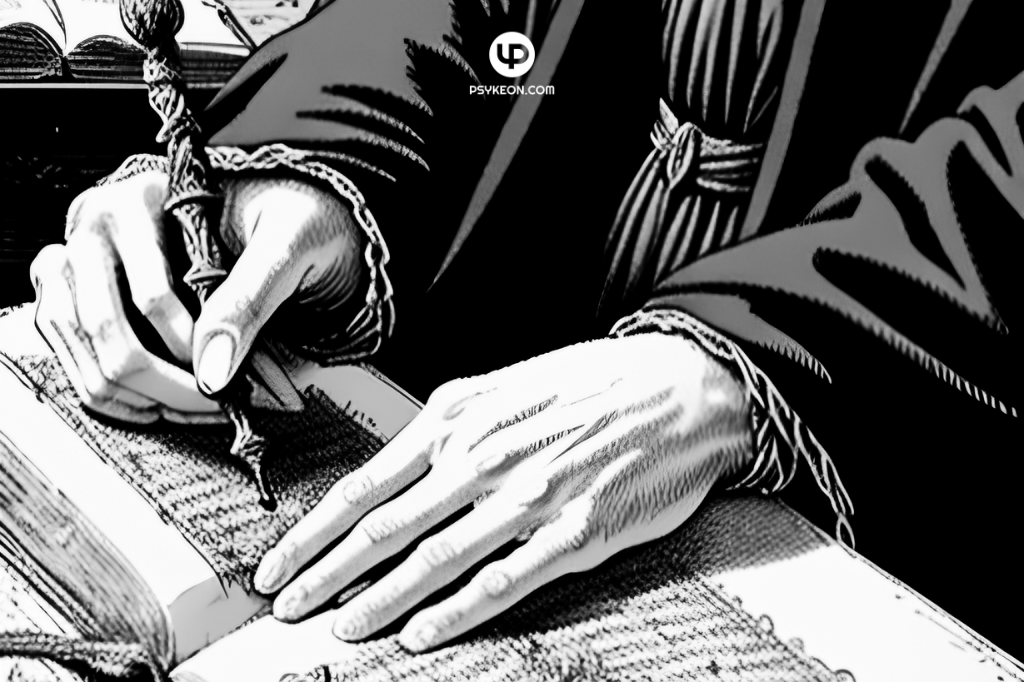Introduction
Look, I’m not the most diligent with my esoteric and tarot notes. It’s tedious, and frankly, it often feels like just another task.
I’m sure you feel the same way sometimes.
In fact, for years, I would just do my readings, think about it for a few minutes, then move on.
But every self-respecting wizard and witch has a grimoire, a book, or a “magical digital portal”, where they store their magical notes, spells and recipes.
The same holds true for esoterists and tarot readers; recording our journey can really help level up our work, and bring it to life into the world.
Without that, wisdom disappears as quickly as it was gained.
In fact, so many traditions have been lost because their knowledge and practices were not recorded by their wise people.
Even when it comes to esoterism, the pen is indeed mightier than the sword.
Some authors, like Aleister Crowley, even wrote about the important of keeping a magical diary before me! (How surprising! /s)
To convince you (and myself) of the importance of this journaling practice, I’ve outlined five ways in which keeping an esoteric journal, or grimoire, can help you deepen your esoteric work, no matter your tradition or preference in practices.
The first three points compose the inward-focused reasons:
- Reviewing
- Learning
- Accountability
Whereas the last two points compose the outward-focused reasons:
- Community
- Legacy
Let’s jump right in.
INWARD-FOCUSED REASONS
- Reviewing – A Custom Record of Your Esoteric Journey/Tarot Readings
This is probably the most straightforward reason…
Who doesn’t want a searchable record of their esoteric or tarot journey, to review over time?
It is honestly the perfect way to review the effects of your readings or rituals as time passes, and to make sure that you remember all of your wild ideas and important insights.
The best thing is, if you choose a blank or dotted journal, you can let your creativity flow freely or design and adjust its pages overtime to meet your own specific and evolving needs.
If you crave a more predictable structure, there’s an ever growing catalog of esoteric journals available online.
Regardless of the route you may choose, this point is about treating journaling like you are creating your own personalized magical archive or library.
As I have indirectly alluded to in the introduction, I am speaking to you from a place of regret: The years of tarot readings that I have lost by not keeping a journal are truly disheartening.
So read on, and don’t repeat the same mistakes I’ve made.
- Learning – Continuous Learning About Esotericism/Tarot
Recording one’s esoteric experiences, thoughts and insights, does not only allow for those to be reviewed in the future, but it also serves as a direct way to learn about, and from, one’s experiences.
Thoughts that get put on paper can be reworked, transformed or workshopped into something entirely different.
Into something that represents the individual’s journey and their inner development.
The tarot reader who records their tarot readings also learns the meanings of each card and deepens their use of the many spreads they use along the way.
They might also discover new connections between the cards, or notice meaningful correspondences between certain symbols of the cards and their life.
Who knows what unique and unpredictable form this continuous learning can take.
- Accountability – Reviewing Your Progress as an Esoterist/Tarot Reader
If we take an even more meta take on the issue, reviewing one’s esoteric and tarot-related notes can also help the practitioner assess and refine their practice itself.
The tarot reader who reviews their readings not only reviews their personal journey and learns about tarot, they also review their own progress and development as a tarot reader.
This includes strengths and limitations, patterns and blindspots.
And, like any accountability tool or partner, it requires self-honesty to be effective.
OUTWARD-FOCUSED REASONS
- Community – Sharing Your Work with Fellow Esoterists/Tarologists
Let’s now take a look outwards, beyond the Self, shall we?
As humans, we exist as part of a network, or, more accurately, multiple interconnected networks.
Those interconnected networks are usually called communities.
I believe that, as members of a broader esoteric community, we have a duty to provide collaboration and guidance to fellow esoterists.
In fact, this is exactly why I am running this blog and writing this article.
But this requires ideas to be expressed on a medium; written, audio or video, and your personal grimoire will most likely be the primary source of most esoterists.
Keeping a grimoire allows you to reach back in your past and use your wealth of knowledge to inform and help others in their own journey.
And the cool thing is, many esoterists do the same, so in reality, information flows from grimoire to grimoire as esoterists exchange ideas and insights between each other.
- Legacy – Becoming a Permanent Part of the timeless Tradition
In the academic field of Western Esoterism, the aforementioned network is sometimes referred to as the Tradition; an uninterrupted series of traditions representing contextualized expressions of a singular universal spiritual reality.
Passed down from generation to generation through translations of manuscripts, fragments, journal entries, transcriptions and primary sources of all types, every esoterist, from Hermes Trismegistus, Iamblichus, Agrippa, Papus, Péladan, Guénon, Schuon, Spare, and more, are situated somewhere in this timeless and eternal Tradition.
Their notes, treaties, books and grimoires are all part of this legacy, and serve as resources for esoterists past, present and future.
And so will your grimoires, especially now, thanks to the internet.
Conclusion
It’s pretty clear now that keeping an esoteric or tarot grimoire is the perfect way to step up your esoteric work, whether it is as a tool for review, learning and accountability, or as a way to contribute to the esoteric community and leave a legacy.
So, grab a journal – or check-out our esoteric and tarot related journals – and get writing!
References
Crowley, A., & Wasserman, J. (2006). Aleister Crowley and the practice of The magical diary. Weiser Books.



